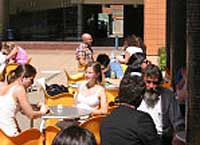|
||||||||||||||||||||||||||
| Food Science and Nutrition - FOODD13060 | ||||||||||||||||||||||||||
This plan is designed to provide depth and breadth in the relevant physical and biological sciences on which food science and technology is based. It is strongly recommended that students obtain, before the completion of the program and during recess periods, as much professionally oriented or industrial experience as possible. The BSc program in Food Science and Technology, and in Food Science and Nutrition (3060) is Pass or Honours, the level of which is determined by academic performance in Stages 1-4 according to a formula determined by the Faculty.
Food Science and Nutrition Plan
Year 1
And ONE of:
And ONE of:
Year 2
Year 3
Year 4
Stream A
Stream B: Industry Module Program
Elective list:
General Education Requirements
Students in this program must satisfy the General Education requirements. In total students have to do 12 UOC of General Education course under program 3060. For further information, please refer to "General Education" in the Table of Contents (see left-hand side of page). Academic Rules Please refer to Program Structure and contact the School of Chemical Sciences and Engineering for the Academic Requirements relating to this program. Internal transfer is permitted from this program to the 3970 Bachelor of Science program. Further Information During Stages 3 and 4 of the program, excursions are made to various food industries. Detailed reports of some of these visits may be required. Professional Recognition
Graduates of this program may qualify for membership of the Australian Institute of Food Science and Technology, the US Institute of Food Technologists, the Royal Australian Chemical Institute or the Nutrition Society of Australia, depending on specialisation.
The program provides basic preparation for food science and technology careers in the food industry, the public sector, education, research, the food service industry, public health, management and marketing. Graduates may also find careers in health and environmental sciences, management of food resources and food wastes, and communication, and in areas such as dietetics after further training. |
||||||||||||||||||||||||||



